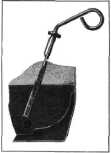1942 - 1947 CHEVROLET SHOP MANUAL
Section 0 General Information - Lubrication
|
|
||||
|
0-6
|
||||
|
|
||||
|
Figure 1 shows the data in the above tables as it
would appear on a thermometer-the
lowest temperature at
which the
|
engines, such as the
Crankcase ventilating system, have
greatly lengthened the life of good lubricating oils. However,
to insure continuation of best
performance, low maintenance cost and long engine
life, it is necessary to change the Crankcase
oil whenever it becomes
contaminated with harmful
foreign materials. Under normal driving conditions draining
the Crankcase and replacing with fresh oil every 2000 to 3000 miles is
recommended. Under the adverse
driving conditions described in the following paragraphs, it
may become necessary to drain the Crankcase oil more frequently.
Driving over dusty roads or through dust
storms introduces abrasive
material into the engine.
Carburetor Air Cleaners decrease the amount
of dust that may enter the
Crankcase. The frequency
of draining depends upon severity of dust
conditions and no definite
draining periods can be recommended.
Short runs in cold weather, such as city driving,
do not permit thorough warming up
of the engine and water may accumulate in the Crankcase from
condensation of moisture produced
by the burning of the
gasoline. Water, in the Crankcase, may freeze and interfere
with proper oil circulation. It also
promotes rusting and may cause
clogging of oil screens and
passages. Under normal driving conditions
this water is removed in the form of vapor by the Crankcase
ventilator. But if water accumulates, due to short runs in cold
weather, it should be removed by draining the Crankcase as frequently
as may be required.
It is always advisable to drain the Crankcase
only after the engine has become
thoroughly warmed up or
reached normal operating temperature.
The benefit of draining is, to a large extent,
lost if the Crankcase is drained
when the engine is cold, as
some of the suspended foreign material will
cling to the sides of the oil pan
and will not drain out readily with the cold, slower moving oil.
CRANKCASE DILUTION
A phase of engine oil
deterioration, probably the most
serious of all, is that of Crankcase dilution.
By Crankcase dilution, we mean a thinning of
the oil due to certain portions
of the gasoline leaking
past the pistons and rings and mixing with the
oil.
Leakage of gasoline, or gasoline vapors, into the
oil reservoir mostly occurs during
the "warming-up" period when the gasoline is not thoroughly
vaporized and burned.
|
|||
 |
indicated grades of oil will
permit easy starting.
When in doubt use the lighter
grade of oil.
NOTE-The use of
20-W is recommended rather than S. A. E. No. 20 if you anticipate
temper-atures to drop to
freezing.
Summer
The use of 20-W, or S. A. E. No.
20 during the summer months
will permit better
all-around performance of
the enine than will the
|
|||
|
heavier body oils with
no appreciable increase in oil consumption
|
||||
|
Fig. 1—Lowest Starting
Temperature for Oils
Indicated
|
||||
|
If S. A. E. No. 20 or
No. 20-W oil is not available, S. A. E. No. 30 oil
may be used if it is
expected that temperatures
will be consistently above 90
degrees F.
|
||||
|
MAINTAINING OIL LEVEL
The Oil Gauge Rod (Fig. 2) is marked
"Full"
and "Add Oil."
These
notations have
broad
arrows pointing
to the level lines.
The oil level should be maintained
between the two lines;
neither going above the
"Full" line nor under the
"Add Oil" line.
 |
||||
|
Fig. 2—Oil Gauge Rod
|
Check the oil level
frequently and add oil when necessary. Always
be sure the Crankcase is
|
|||
|
full before starting on a long drive.
|
||||
|
WHEN TO CHANGE
CRANKCASE OIL
Some oils have been greatly improved, driving
conditions have changed, and
improvements in
|
||||
|
|
||||